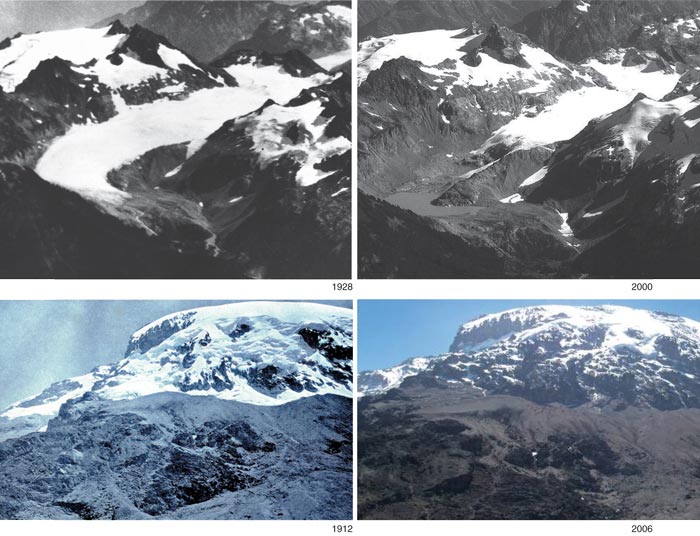In places like Africa and more specifically areas around Mount Kilimanjaro the affects of global warming can already be felt. As this image clearly shows, the snow-covered mountain has recently lost large portions of its snow, due largely to global-warming.

This image above shows the effects global warming has had on Mount Kilimanjaro.
The snow on top of this mountain provides water to millions of Africans, and once it is gone these same people will be without access to freshwater. Because of situations like this in Africa and around the globe, it is critical that climate change policies address and stop the cause of this more recent problem: human beings wastefulness.
Controversy, however, still surrounds whether or not humans are the cause of global warming, which I intend to clear up. Within this debate a scientific consensus has already been reached that the source of carbon is human beings. The question is whether this increase in carbon (by human beings) is definitively causing climate change.
Science has concluded that without a greenhouse affect the Earth would be well below freezing. For this reason, ice & snow records along with tree rings show that a greenhouse affect and carbon gasses have always been present in the atmosphere. However, within the past century, particularly since the Industrial Revolution, it appears that carbon and greenhouse gas emissions have dramatically risen. For instance, since 1800 the atmospheric carbon dioxide has risen from 280 to over 370 parts per million. Because fossil-fuel utilization rates have been measured, it appears that their rates explain the increase in atmospheric carbon dioxide.
Moreover in the past it appears that atmospheric carbon dioxide rates were caused by the fact that Earth is naturally highly radioactive. It appears that since the Industrial Revolution, this radioactivity has declined. On account of the sources of this radioactivity, largely volcanoes and the deep ocean, losing their spark then the only logical connection is that fossil fuels are the cause of global warming. This information, along with fossil fuel utilization rates, implicates humans as a significant cause of the recent changes in CO2 emissions.
The question is what can we do at this point. Scientists have for decades been conducting research and presenting their findings, with limited to no success. This leads me to think a new approach is necessary for action to be taken.

This images from the BBC shows the faces of global warming and what will happen if immediate action is not taken.
Peter Singer, a Professor of Bioethics at Princeton University, wrote “Famine, Affluence, and Morality” to describe the moral obligations shared by all humans. He states, “If it is in our power to prevent something very bad from happening…we ought morally to do it,” because he believes that most of the major problems in the world such as poverty and pollution are global issues. Applying this concept to global warming, because scientific evidence has not swayed policy makers to create stringent climate change policies then I would suggest we use images of the people will suffer most to sway policy makers. If we can’t do it for the Earth then lets at least make change for the people who will suffer if immediate action is not soon taken.